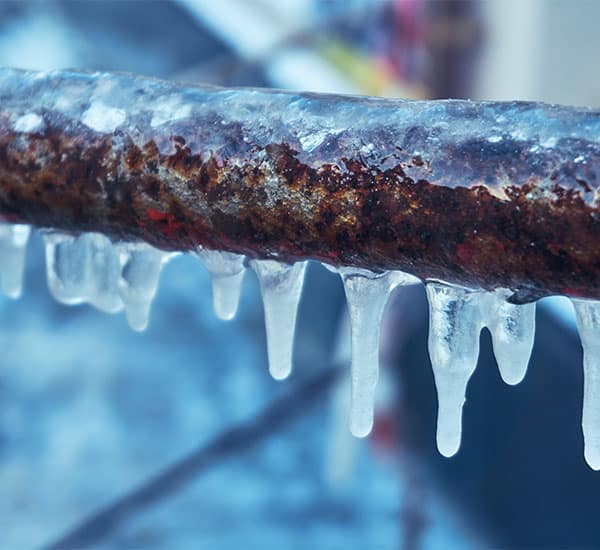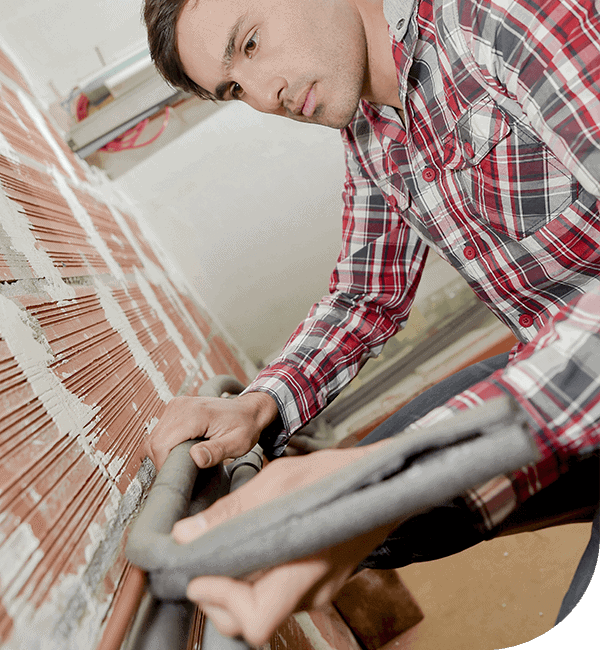Frozen Pipe Repair
Handling the Upstate’s Needs This Winter
While we do live in a southern climate, our pipes are that much more susceptible to freezing for a couple reasons. First, the pipes are more likely located in unprotected areas outside the insulation. Second, we often forget about the dangers of exterior plumbing and leave garden hoses attached to their spigots. Surprisingly enough, even in Upstate South Carolina one of the more common jobs we handle during the winter is fixing frozen pipes. Commercial businesses and residential homes alike can both suffer from pipe freezing and Ken’s Plumbing can help.
What Causes Frozen Pipes?
Extremely cold weather conditions are the main reason pipes freeze. You’ll most often see this issue arise in unheated areas like a basement, crawl space, attic, or garage. Exterior pipes like garden hoses, swimming pool supply lines, or water sprinkler lines often experience the wrath of vicious weather as well, as they’re constantly exposed to cold temperatures if not stowed away. When water freezes in a pipe, the pipe expands and can exert enough pressure to cause more than 250 gallons of water to burst out.

How Do I Prevent A Frozen Pipe?
- Disconnect, drain, and store hoses and sprinklers. Install covers on outside faucets.
- Keep the temperature at 65 degrees or higher, even when leaving the house.
- Open cabinet doors below sinks to allow in heat from the home.
- Wrap pipes nearest exterior walls and in crawl spaces with pipe insulation or heating tape. Poorly insulated homes, such as older ones, are the reason pipes burst. Insulating walls and crawl spaces can prevent freezing.
- Close all windows near water pipes; cover or close open air vents. Freezing temperatures combined with wind drafts can cause pipes to freeze more frequently.
- If you plan to be away from home for an extended period of time, shut off water supply valves to your washing machine.

What to do during severe weather
- Allow faucets to drip. Water dripping from the faucet reduces the pressure in the pipe, so even if it does freeze, the pipe won’t burst.
- Check every faucet’s water flow and pressure before bedtime and after you wake up.
- Check pipes around your water meter, in unheated areas, near exterior walls, and in crawl spaces.
- Identify cold air drafts near pipes, such as drafts in your garage if pipes are located there.
What to do if a pipe freezes
- Heat water on the stove, soak towels in the hot water and wrap them around the pipes.
- Starting nearest to the faucet and work your way back until the pipe is thawed.
- Make sure the faucet is turned on when you’re trying to thaw it out so the melted water can drip out.
- Call the experts at Ken’s Plumbing if you think the problem is bigger than you’re able to handle on your own.
We work even when you don’t – 24/7/364 – every day but Christmas.
If you live in an older home, call us today at Ken’s so we can make sure your piping structure is up to par, as we’ve seen many families struck with a hefty and unexpected bill due to poorly insulted exterior walls. If you live in a newer home, it’s still a good idea to make sure things are running smoothly with your plumbing before the extremely cold weather hits us in January and February.

